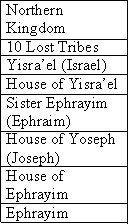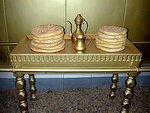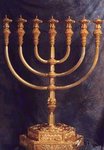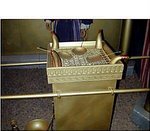In last month’s article I gave an overview of Passover or Pesach. I will attempt an overview now. Exo. 12:30-31, 34 states that after the first born sons were killed, that Pharaoh finally allowed the Children of Israel to go. “And Pharaoh rose up in the night, he and all his servants, and all the Mitsrites. And there was a great cry in Mitsrayim (Egypt), for there was not a house where there was not a dead one. Then he called for Mosheh and Aharon by night, and said, “Arise, go out from the midst of
 my people, both you and the children of Yisra’el. And go, serve Yahweh as you have said. Take both your flocks and your herds, as you have said, and go. Then you shall bless me too.” And the people took their dough before it was leavened, having their kneading bowls bound up in their garments on their shoulders.” The people were in such a hurry that they didn’t have time to finish letting their bread rise.
my people, both you and the children of Yisra’el. And go, serve Yahweh as you have said. Take both your flocks and your herds, as you have said, and go. Then you shall bless me too.” And the people took their dough before it was leavened, having their kneading bowls bound up in their garments on their shoulders.” The people were in such a hurry that they didn’t have time to finish letting their bread rise.Yahweh tells Moses to tell the people to remember this each year by not eating leavened bread for 7 days. He even goes so far as to tell them to remove it from their midst and that no leaven should be found in their homes. See Exo.12:15-20 & Lev. 23:6. It was to be a High Sabbath and a memorial to be kept forever.
The Feast of Unleavened Bread is actually during the Passover meal and continues for seven days. A Leavening agent is yeast. Therefore they were not to eat anything with yeast in it, so popcorn is ok! As well as rice, beans, pasta, matza bread, and my personal favorite, the Sephardic matza, otherwise known as… the Tortilla! Now if you were to talk to a Orthodox Jewish Rabbi, they would tell you that rice, beans, pasta, etc. are not allowed according to their Talmud, or Oral Torah. I will explain what the Talmud (Oral Torah) is at a later edition but suffice it to say that we are not under those laws. Those are man-made laws not Yahweh’s commands.

First Fruits was to be observed the first day after the Sabbath, and after Unleavened Bread began. Lev. 23:11, 14b, 15 “And he shall wave the sheaf before Yahweh, for your acceptance. On the morrow after the Sabbath the priest waves it. ...a law forever throughout your generations in all your dwellings. ...And from the morrow after the Sabbath, from the day that you brought the sheaf of the wave offering, you shall count for yourselves: seven completed Sabbaths.”
This was an offering to Yahweh. Giving Him the first of our plenty. Yahweh requires the first of everything we have.
Now for my favorite part, let’s connect Yahweh’s command with Yahshua’s fulfillment. Paul (Shaul) tells the Corinthians to put out an unrepentant man from their assembly, stating that a little contaminant is like yeast; it spreads through the whole lump of dough. The Corinthians, who were just coming out of paganism, were to apply this understanding to their keeping of the Festival of Unleavened Bread. 1Cor. 5:7-8 “Therefore cleanse out the old leaven, so that you are a new lump, as you are unleavened. For also Messiah our Passover was offered for us. So then let us observe the festival, not with old leaven, nor with the leaven of evil and wickedness, but with the unleavened bread of sincerity and truth.”
The first day of the feast (festival) of Unleavened Bread can be seen as the day we repented and began our journey to leave our sins behind. This week should be a lesson to us, a reminder each time we eat a piece of unleavened bread, to discover what we should discard in our walk.
Yahshua also calls Himself the Bread of Life. John 6:47. The Word of Yahweh is also known as Bread. Isa. 55:1, Ezek 3:1, Rev. 10:8. John 1:1 “In the beginning was the Word, and the Word was with Elohim, and the Word was Elohim. He was in the beginning with Elohim. All came to be through Him, and without Him not even one came to be that came to be.” So He is the Bread of Life, The Word is called Bread, and Yahshua is called the Word. So this week can also be a time to remember Him being our Life and the Word of Yahweh.

First Fruits was to be on the day after the Sabbath, after Passover, Sunday. Matt. 27:52-53; “and the tombs were opened, and many bodies of the set-apart ones who had fallen asleep were raised, and coming out of the tombs after His resurrection, they went into the set-apart city and appeared to many.” John 20:17-18; “Yahshua said to her, ‘Do not hold on to Me, for I have not yet ascended to My Father. But go to My brothers and say to them, “I am ascending to My Father and your Father, and to My Elohim and your Elohim.”
Between Pesach and the Yom haBikkurim waving of the barley sheaf, the High Priest would remain in seclusion so that he would not become defiled before the waving of the first-fruits. Yahshua was “in seclusion” in the tomb between Pesach and Yom haBikkurim when He emerged from the tomb as our High Priest to wave the long foreshadowed first of the first-fruits of the dead offering before Elohim His Father. 1 Cor. 15:20; “But now Messiah has been raised from the dead, and has become the first-fruit of those having fallen asleep.”
Ephesians 4:8“That is why it says, ‘When He went up on high, He led captivity captive, and gave gifts to men.’”
Yahshua gave the gift, the first-fruits of eternal life, to those who were part of that very first resurrection of the dead. He was the first of the first-fruits from the dead, and they were as a fragrant sheaf, a delightful wave-offering of the resurrected sons of men, presented to the Father the year that Yahshua became the Pesach Lamb.
To understand Unleavened Bread and First Fruits we must understand when Yahshua was killed and when He arose. On the next page you will see a calendar of the Month of Aviv. Let’s look at the events from scripture. “And it was the preparation of the Passover, and about the sixth hour: and he saith unto the Jews, Behold your King!”John 19:14
“The Jews therefore, because it was the preparation, that the bodies should not remain upon the cross on the Sabbath day, (for that Sabbath day was an high day,) besought Pilate that their legs might be broken, and that they might be taken away. John 19:31.
“And on the first day of the week Miryam from Magdala came early to the tomb, while it was still dark, and saw that the stone had been removed from the tomb.” John 20:1.
So we know from Scripture that on the first day of the week before the sun had rose, Yahshua had already departed from his tomb and was long gone. The first day of the week starts when the sunsets on the Sabbath and this is probably when she went to the tomb as it was customary to change the burial cloth after three days and this would have been the first opportunity to do so because it is also customary not to touch a corpse on the Sabbath. Knowing that Yahshua was to rise in late after-noon we know that it was not late after-noon of the first day of the week (Sunday) but of the Sabbath (Saturday). So if He arose on a Sabbath that means He died on a
 Wednesday.
Wednesday.We can go back a few days sooner and see that the Triumphal Entry was also on the Sabbath before. The ritual of choosing the Sacrificial Lamb without blemish for the Passover and the entry of the Sacrificial Lamb into the city gates was observed four days on the 10th day of the month which would make it a Sabbath. “And Yahshua went into the temple of Yahweh, and cast out all them that sold and bought in the temple, and overthrew the tables of the moneychangers, and the seats of them that sold doves,” Matthew 21:12. What day did the Jews gather in the Temple? It was on the Sabbath, they were changing money for tithes, offerings, and temple taxes and selling items for offerings such as doves on the Sabbath in the Temple. This was right after the triumphal entry.
View the calendar on the next blog titled "When Did Yahshua Rise, Calendar of Events" for the series of events. I encourage you to check out each Scripture reference and see the time table for yourself. Blessings & Shalom.














